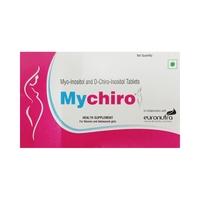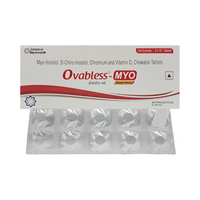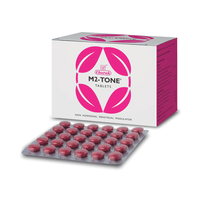Rs.142for 1 strip(s) (10 tablet sr each)
food interaction for Supraglip-M
alcohol interaction for Supraglip-M
pregnancy interaction for Supraglip-M
lactation interaction for Supraglip-M
food
alcohol
pregnancy
lactation
Supraglip-M Forte Tablet SR is to be taken with food.
Supraglip-M Forte Tablet SR may cause stomach upset if taken on empty stomach.
None
Supraglip-M Forte Tablet SR may cause stomach upset if taken on empty stomach.
None
CAUTION
It is unsafe to consume alcohol with Supraglip-M Forte Tablet SR.
UNSAFE
Supraglip-M Forte Tablet SR may be unsafe to use during pregnancy. Although there are limited studies in humans, animal studies have shown harmful effects on the developing baby. Your doctor will weigh the benefits and any potential risks before prescribing it to you. Please consult your doctor.
CONSULT YOUR DOCTOR
Supraglip-M Forte Tablet SR is probably unsafe to use during breastfeeding. Limited human data suggests that the drug may pass into the breastmilk and harm the baby.
CONSULT YOUR DOCTOR
SALT INFORMATION FOR Supraglip-M
Metformin(1000mg)
Uses
Metformin is used in the treatment of type 2 diabetes mellitus and polycystic ovarian syndrome (PCOS).
How it works
Metformin is an anti-diabetic medication (biguanide). It works by lowering glucose production in the liver, delaying the absorption of sugar (glucose) from the intestines, and increasing the body's sensitivity to insulin.
Common side effects
Diarrhea, Headache, Vomiting, Nausea, Flatulence, Indigestion, Vitamin B12 deficiency, Abdominal discomfort, Hepatitis (viral infection of liver), Drug eruptions, Lactic acidosis, Hypoglycemia (low blood glucose level)
Teneligliptin(20mg)
Uses
Teneligliptin is used in the treatment of type 2 diabetes mellitus. It is used along with diet and exercise to improve blood sugar control in adults with type 2 diabetes.
How it works
Teneligliptin is an antidiabetic medication. It works by increasing the release of insulin from the pancreas and decreasing the hormones that raise blood sugar levels. This reduces the fasting and postmeal sugar levels.
Common side effects
Headache, Eczema, Constipation, Dizziness, Diarrhea, Fever, Hypoglycemia (low blood glucose level), Nausea, Vomiting, Prolonged QT interval, Increased liver enzymes, Liver dysfunction, Intestinal obstruction
SUBSTITUTES FOR Supraglip-M
74 Substitutes
74 Substitutes
Sorted By
 Rs. 147.34pay 1% more per Tablet SR
Rs. 147.34pay 1% more per Tablet SR Rs. 216.37pay 52% more per Tablet SR
Rs. 216.37pay 52% more per Tablet SR Rs. 221.70pay 4% more per Tablet SR
Rs. 221.70pay 4% more per Tablet SR Rs. 149.53save 27% more per Tablet SR
Rs. 149.53save 27% more per Tablet SR Rs. 280.81pay 28% more per Tablet SR
Rs. 280.81pay 28% more per Tablet SR
Expert advice FOR Supraglip-M
- You have been prescribed Metformin to control the blood sugar level and reduce the risk of diabetic complications such as heart attacks.
- Chances of weight gain and low blood sugar are lesser with this medicine as compared to other diabetes medicines.
- Hypoglycemia (low blood sugar level) may occur when taken along with other antidiabetic medicines, alcohol or on delaying/skipping a meal. Carry a sugar source with you for immediate relief.
- Tell your doctor immediately if you experience any deep or rapid breathing, persistent nausea, vomiting, and stomach pain as Metformin may cause a rare but serious condition called lactic acidosis, which is an excess of lactic acid in the blood.
- Prolonged use of Metformin may lead to vitamin B12 deficiency which may lead to anemia, causing fatigue, pale skin, shortness of breath or headache. Notify your doctor if you experience any of these as you may require supplements.
- Your doctor will monitor your blood sugar levels and kidney functions regularly while you are taking this medication.
Frequently asked questions FOR Supraglip-M
Metformin
Q. What does Metformin do exactly?
People with type 2 diabetes are not able to make enough insulin or respond normally to the insulin made by their bodies. When this happens, the concentration of sugar/glucose increases in the blood. Metformin acts in several ways to reduce the increased levels of sugar in blood. Metformin decreases glucose production from the liver and decreases absorption of glucose from the intestine after taking food while improving the sensitivity of the body organs and muscles towards insulin. This helps improve the uptake of glucose from the blood. It also helps your body to respond better to the insulin it makes naturally.
Q. Does Metformin cause weight loss?
Yes, Metformin has been shown to cause weight loss in people who are overweight or obese. It may also cause a modest loss in weight in those overweight and obese individuals who are at risk for diabetes. In addition, patients who are sensitive or resistant to insulin may also show weight loss. But, do not start taking this medicine for weight loss on your own. Consult your doctor for the same.
Q. What are the benefits of taking Metformin?
Metformin is one of the first medicines that is given to patients with high blood sugar levels. It helps control blood sugar levels. It promotes the body’s response to the insulin made by the pancreas, decreases the amount of sugar made by the liver and decreases the amount of sugar absorbed by the intestines. Unlike other oral antidiabetic medicines, Metformin when taken alone, rarely causes low blood sugar as it prevents the pancreas from secreting more insulin. In addition to being a great medicine to lower blood sugar levels, it also helps in controlling weight gain.
Teneligliptin
Q. Does Teneligliptin cause weight gain?
No, Teneligliptin is not known to cause weight gain by itself. However, keeping a healthy weight is an important part of managing diabetes. Consult your doctor if you experience weight gain while taking Teneligliptin.
Q. Is Teneligliptin bad for your kidneys?
No, Teneligliptin is not bad for your kidneys if your kidney function is normal. However, it is important to inform your doctor if you have, or ever had, any kidney problems. If you have kidney problems, you may need dose modification.
Q. Do I still have to manage my diet and exercise while on Teneligliptin?
Yes, it is important to manage your diet and exercise while taking Teneligliptin. In addition to medicine, making healthy food choices and being physically active are also important to effectively manage blood sugar levels. You may consult a dietitian and follow a diet chart that suits you best. A well-balanced diet is one part of a healthy lifestyle for people with type 2 diabetes. Additionally, thirty minutes of exercise such as a brisk walk is recommended.






















